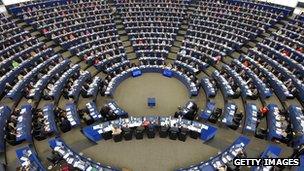Acta: Piracy treaty dealt critical blows in EU votes
- Published

Three key EU committees have voted against the controversial Anti-Counterfeiting Trade Agreement (Acta).
The treaty, which aims to curb piracy, was rejected by committees tasked with assessing its legality and impact on civil liberties and industry.
To date 22 member states, including the UK, have signed the treaty - but it is yet to be formally ratified.
The European Parliament will make its final decision on Acta in July.
If it passes, work to bring the agreement into force across the EU will continue. For the agreement to be made EU law, all member states would need to give their backing.
If the European Parliament votes to reject Acta, the treaty will be scrapped entirely.
While the agreement covers the counterfeiting of physical items, such as pharmaceuticals, it is the measures relating to pirated material on the internet that have caused most concern among campaigners.
The agreement suggests setting international standards over how copyright infringements are dealt with. Possible measures include possible imprisonment and fines.
However, critics say it is a potential threat to freedom of speech online.
The latest round of voting involved the Committee on Legal Affairs (Juri), Committee on Civil Liberties (LIBE) and the Committee on Industry, Research and Energy (ITRE). All three voted to express "opinions against Acta".
'Potential threats'
Their views will now be considered by the larger International Trade Committee (Inta) which will in turn make a formal recommendation to the European Parliament.
Inta's appointed rapporteur on Acta, David Martin, has strongly condemned the treaty.
In April, he said: "The intended benefits of this international agreement are far outweighed by the potential threats to civil liberties."
Inta will vote on the matter on 21 June.
'Historic opportunity'
Speaking on the latest vote, Loz Kaye, leader of the Pirate Party UK, said: "Today has seen significant recommendations to reject Acta in three different EU committees. That's the kind of 'three strikes' I can get behind.
"The European Parliament now has an historic opportunity to show it can be useful and reject Acta outright."
The Open Rights Group's Peter Bradwell said: "Together the votes are a protest against an unnecessarily imbalanced and ill-considered treaty."
The UK, which signed the treaty in January, still backs the treaty.
"The UK supports the aims of Acta and continues to support a global co-ordinated approach to intellectual property enforcement," said the government's Intellectual Property Office in a statement.
"We are watching the developments at the European Parliament carefully and respect whatever decision they make regarding Acta."
'Protection against piracy'
The treaty has provoked discontent across the world since an initial draft was released by Wikileaks in 2008.
Open-rights campaigners argued the measures were being debated in secret.
Across Europe thousands of protesters demonstrated to voice their objections to the agreement.
The treaty's backers have said it would not alter existing laws, and would instead provide protection for content creators in the face of increasing levels of online piracy.
Nevertheless, the proposals have encountered a slew of objections.
In February, the European Commission referred the matter to the European Court of Justice to judge on whether Acta complied with human-rights laws.
This process was expected to delay ratification proceedings, but members of Inta voted to go ahead with pre-planned timetable.
Euro MP Kader Arif, who resigned from his post as rapporteur for Acta in January, said he did so in protest at the "masquerade" of negotiations.
Meanwhile, several countries distanced themselves from the agreement, including Germany and Poland, where large protests took place.
Most recently, lawmakers in the Netherlands urged rejection of the treaty over fears that it breached the country's constitution.
Outside the EU, the treaty also has the support of the US, Australia, Canada, Japan, Morocco, New Zealand, Singapore and South Korea.
- Published16 April 2012
- Published8 March 2012
- Published8 March 2012
- Published8 March 2012